We Can't Live On Rockall (But For Some Reason We Keep Trying)
"The smallest point of a pencil could scarcely give it a place on any map that should not exaggerate its proportions..."
Hello! This is Everything Is Amazing, a newsletter about science, curiosity, attention and wonder.
Continuing this season’s look at islands, I’d like to drag you away from the warmth and far out to sea - to a place bludgeoned by the largest waves ever recorded by scientific instruments in the open ocean, to explore the final, and perhaps the most ludicrous, territorial acquisition of the British Empire.
There’s a stiff breeze as we set off, an icy wind that slices through even the fluffiest fleece jacket. And that sky ahead doesn’t look too clever. Um. Are we sure this is a good idea?
Of course it isn’t! And how fitting that is, because we’re going somewhere where good ideas have never been the least bit welcome. Hooray!
Off we go, our ship chugging past the inviting harbours of the Outer Hebrides, the sea starting to roil and heave as we leave the land far behind…
You don’t get sea-sick, do you?
You don’t, you say?
Well, we’ll see. We’ll see.
A few hours and 40 miles out, we’re passing the archipelago of St Kilda, a broken scatter of islands, some so alarmingly vertiginous they look like they’re up on end.
St Kilda has a fascinating history (with human occupation from around 6,000 years ago until one terrible month in 1930) - and if there was any justice in this world, we’d have the time to stop and go exploring the ruins there. But these aren’t seas you linger in, so on we must go.
Out. And out. And out.
Damnation, there’s nothing out here but heaving ocean. Truly nothing. Best to turn round while the weather holds, surely?
Probably, yes! But we’re still keeping going, into these increasingly mountainous waters under that darkening sky.
And around 187 miles west of St Kilda, through the driving sea-spray as the deck rollercoasters from one wave to the next, we see…something. A sail, perhaps – a steady fleck of white against the gun-metal sea.
It’s tiny – hardly there at all. Yet in such a landscape of increasingly violent movement, it’s the only stationary thing.
Land.
I’m 8 years old.
I’m curled up on the airline seats we’d salvaged from a scrapped passenger plane, on the patio at the back of my parents’ United Nations (British forces) married quarters in Nicosia, Cyprus. On the seat next to me is our black plastic tape recorder with the see-through lid that flies off when you press Eject. It’s whirring – crackling out episode 4 of season 6 of The Goons, entitled “Napoleon’s Piano.”
Picture this (it’ll be a struggle, but please try): the Goons, for reasons too ludicrous to explain, are sailing the ‘fabled’ piano of Napoleon Bonaparte from the French coast back to England. After various days at sea – signified by one of the cast pretending to puke, which 8-year-old-me absolutely loved – a helicopter appears and drops Sea Ranger Bluebottle into the water.
He clambers onboard:
Seagoon: [Straining] Heeuuueeeuuueeeuuup! For those without television, I’ve pulled him back on the piano.
Bluebottle: Piano? This is not a piano. This is Rockall.
Seagoon: This is Napoleon’s piano.
Bluebottle: No.. no, it is not.
Seagoon: It is.
Bluebottle: No, it isn’t.
Seagoon: It’s Napoleon’s piano.
Bluebottle: No, this is Rockall. We have tooked it because it is in the area of the rocket testing range.
Seagoon: Rocket testing range? I’ve never heard so much rubbish in all my…
SFX: [Whooooosh… BOOOM!]
(As an adult, I really enjoy the implied suggestion that the Goons are so catastrophically rubbish at sailing that they get lost while crossing the 26-mile-wide English Channel - and end up 740 miles away on the opposite side of Britain.)
“Rockall?”
This being the pre-internet 1970s, I ask my Dad what that is. He vaguely mumbles something about the shipping forecast.
Northwest of Ireland, the Rockall Trough marks where the continental shelf ends, the sea floor dropping away to an abyssal depth – and at the other side of it rises a plateau of rock as long as Scotland.
In just one place does it fully break the surface – a small nib of granite, the remains of a volcanic plug, poking just 20 metres (70 feet) above waves that occasionally burst right over it.
“…the smallest point of a pencil could scarcely give it a place on any map that should not exaggerate its proportions.”
There are a few accompanying sea-level reefs that *just* break the waterline on a calm day, including Hasselwood Rock, 200 metres north of Rockall. But that’s all.
This is worth stressing. Stand on Rockall, and you’re standing on the only piece of land for hundreds of miles in every direction, in some of the tallest seas in the world. (In 2000, oceanographers recorded individual waves up to 29 metres tall over the Rockall Trough.)
So you’d be mad to try?
Tell that to survival expert Tom McLean, who clambered onto the islet on the 26th May 1985 (after more than one attempt) and stayed until the 4th of July, living in a homemade plywood box.
Tell that to Nick Hancock, who achieved the current world record in 2014 with a thrilling/terrifying 43-day stay.
Tell that to army veteran Christopher Cameron - who would probably agree that the idea is completely bonkers - after he abandoned his attempt this summer to survive 60 days on Rockall when much of his survival equipment was destroyed by wind and waves and he was almost swept off the rock that following night:
“He said he knew "something was up" when the island's many birds disappeared.
"I'd suffered two weeks of storms and it was literally sustained westerlies for 25 knots for two weeks," he added. "I could handle that because I know it can be a dreadful stormy place.
"The waves just continued to mount and mount and mount, until two days before I made the call, I could no longer remain in the accommodation - my kit was being washed away, the webbing and ropes were being worn through with the constant to and fro of the waves."
After receiving the distress call at 08:55, the Maritime and Coastguard Agency sent a search and rescue helicopter from Stornoway to Rockall.
Mr Cameron was rescued 10 hours after he called for help.”
- “'I was off my head', says man rescued from Rockall world record bid” - BBC News
And there’s Greenpeace, who landed on Rockall in 1997 and renamed it “Waveland”, a micronation protesting against plans to drill for oil in the area.
(The British government drolly replied that since it was British territory, Greenpeace’s British citizens were perfectly within their rights to go there – and then proceeded to ignore them entirely).
So why on earth did Britain take great pains to lay claim to Rockall in the first place?
It wasn’t just a case of drawing a line on a map – it required a landing. The first recorded footfall was Captain Basil Hall’s foray from HMS Endymion on Sunday, 8th September 1811 - so why wait until 1955 to annex the islet (formalized in 1972 with the Island of Rockall Act)?
The truth seems to be a mixture of paranoia and high farce. It wasn’t about securing oil or fishing rights – it was about foiling those pesky Russians.
Secret weapons testing is a tricky business. You need lots of room (as befits the “weapons testing” bit) and you need to be away from prying eyes (“secret”). And here in one of the most crowded corners of Europe, you’d be hard-pressed to find either. The logical solution is to take to the sea, and what better direction than into the uninhabited far-fringes of the Outer Hebrides?
These therefore became the theatre for the testing of the UK’s first surface-to-surface nuclear missile, the Corporal II, with launches tracked by a radar installation on St Kilda.
And here’s where it turns into an episode of Dad’s Army.
It’s quite possible that someone in the government glanced at a report on Rockall, saw the word “land” and immediately envisioned a hammer and sickle fluttering above an island fortress festooned with radar dishes. Rockall was, in the words of geographer Fraser MacDonald, “sufficiently near to the range to be an embarrassment if it were acquired by some foreign power.”
Never mind the fact that nothing can cling to Rockall for long, barring truly astounding quantities of bird crap (see above).
Never mind that Soviet spy ships could have done the job for a fraction of the cost and easily scarper out of range when detected.
No! Being “land,” Rockall was a threat to national security. It was obvious. We had to have it.
Since 2016 when Brexit tossed the economic rulebook overboard, Rockall has become the focus of a very different and rather more bitter type of conflict:
“Scotland and Ireland have been at loggerheads over access to fishing grounds within 12 nautical miles of Rockall since the Brexit referendum in 2016, which signalled an end to the UK’s membership of the common fisheries policy.
Scottish fishery protection vessels have intercepted and boarded Irish trawlers caught fishing for squid and haddock around the uninhabited islet, with skippers facing arrest and a ban from fishing in British waters if they are caught.”
- “Rockall fishing rights dispute between Scotland and Ireland deepens” - The Guardian
(See also: “The Fight Over A Shitty Rock” - Greg Noone, Hakai Magazine.)
Half a century on, this speck of an underwater mountain-top continues to exert its curious pull on our imagination. It’s not now true that more people have landed on the Moon than on Rockall, but the numbers aren’t far off.
It remains a challenge for the adventurous, a curiosity for historians, and for me, a word associated with my earliest stirrings to see the world’s remotest corners…
But you’d never, ever get me up there. Sail on, mate. Sail on.
Images: Andy Strangeway / Geograph (Wikimedia Commons), Duncan McNab, Al Elmes, James Fisher (Wikimedia Commons), Andy Strangeways / Geograph (Wikimedia Commons), Irish Defence Forces/Wikimedia Commons.

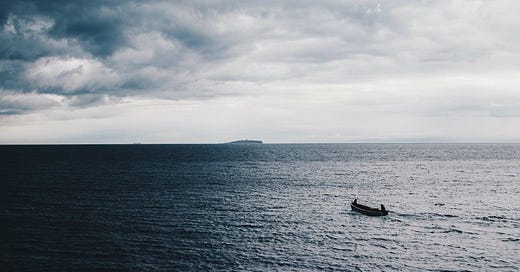



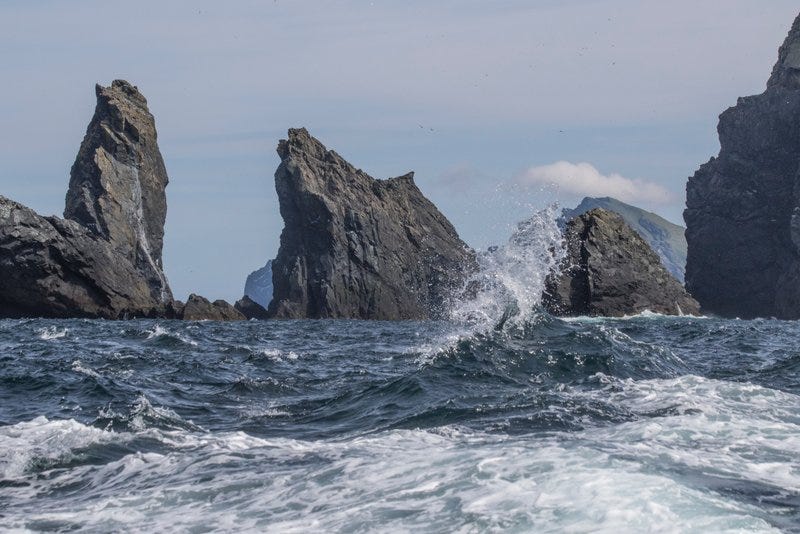
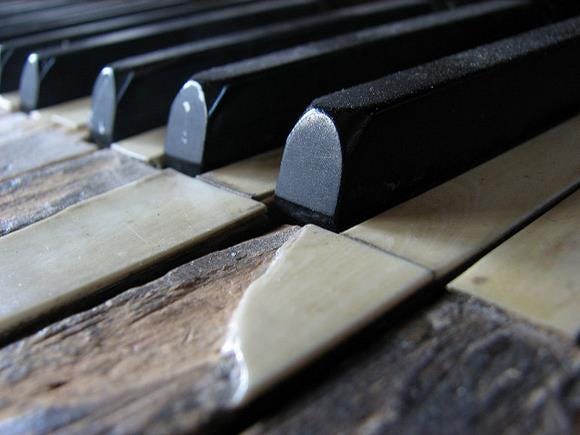
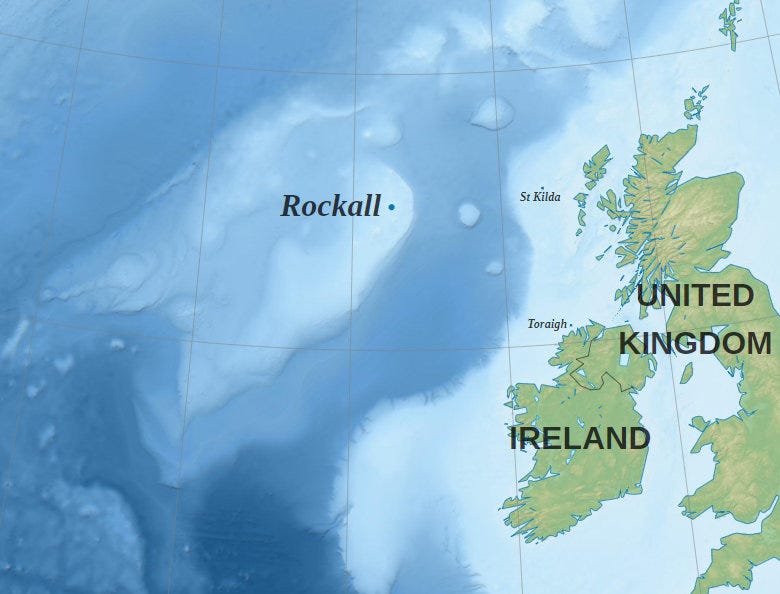
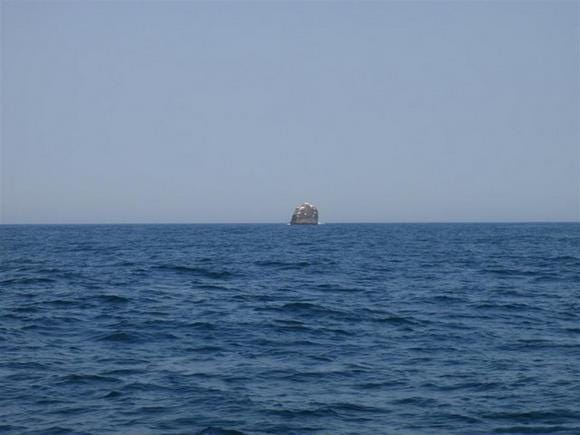
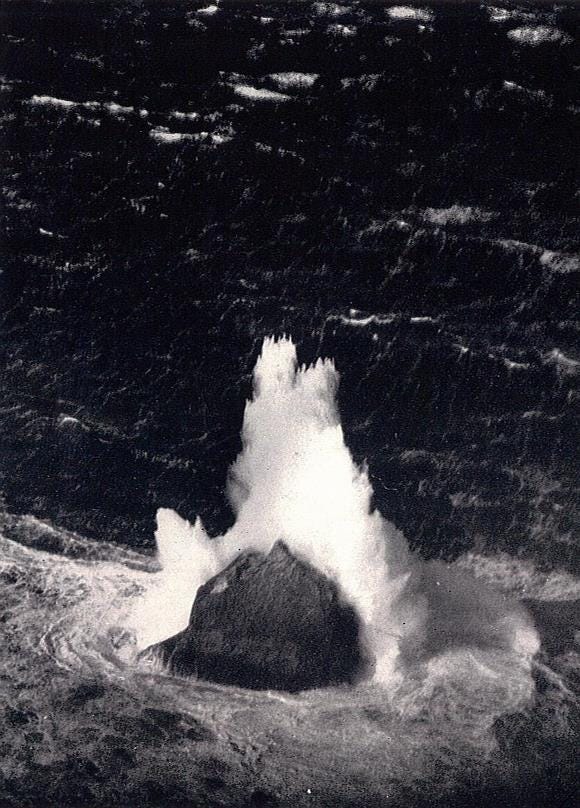
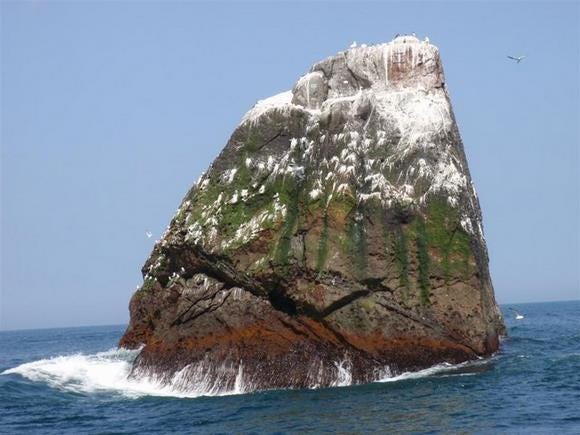
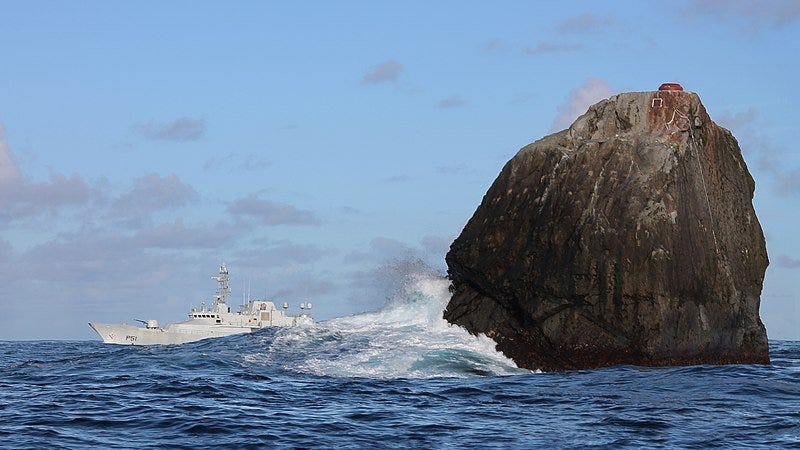
Mike, I'm painfully aware & a tad guilt - ridden ( I'll recover in a week to 10 days..... ) that I haven't commented of late, but you do deliver quite the verbal feast, with salmon, oysters & champagne, yet !
HAPPY NEW YEAR 2024, also the Lunar New Year of the Dragon - to you & all ! Thank you ! I'm Italian, Russian & Irish, so being effusive comes with the territory.....
Ok I love this. Of course I do.